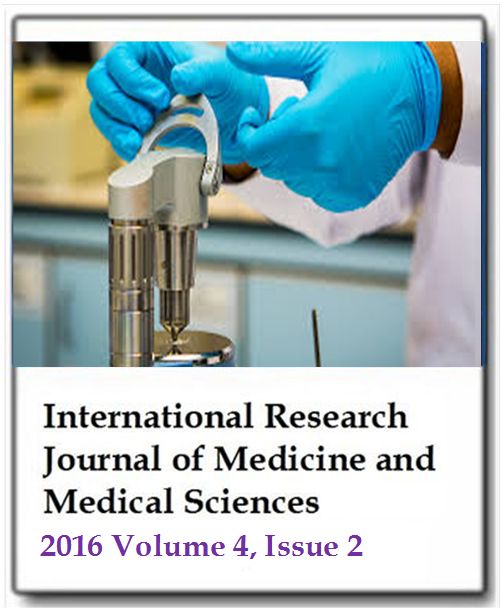Influence of non-surgical periodontal therapy on type II diabetes mellitus
Shahida Maqsood, Hasan Baber, Maqsood Ahmed Soomro, Fauzia Quadir, Quratul Ain Maqsood, Masood Anwar Qureshi and Sadiqa SyedInternational Research Journal of Medicine and Medical Sciences
Published: June 27 2016
Volume 4, Issue 2
Pages 24-30
Abstract
Dental clinicians often come across patients having chronic systemic conditions, like diabetes, which has a direct influence on the onset, duration, and management of periodontal disease. Type II diabetes mellitus is considered as a contributing factor instead of being a primary etiologic factor, acting as an initiator of periodontitis. Type II is characterized by loss of ielts cells of Langerhans and survival is possible by external application of insulin. Prevalence of periodontal disease and diabetes is known to increase with an increasing age. Identification and characterization of diabetic patients with high risk of periodontal disease are needed and this is what the study focuses on. This research was an interventional study aiming to narrow the gap by acquiring possible relationship between type II diabetes and periodontal disease group of patients after surgical/non-surgical periodontal therapy in local Pakistani Population. This interventional study was conducted on 104 males and female patient suffering from T2DM (aged 25 to 65 years). Periodontal parameters were calculated by using the community periodontal index need, comprising bleeding on probing, tooth mobility and furcation involvement. Non-surgical periodontal treatment was performed and systemic doxycycline treatment was prescribed for two weeks. The glycated hemoglobin, fasting and random blood glucose levels were determined, at the baseline before non-surgical periodontal therapy and after three months of treatment using commercially available kits. The periodontal parameters significantly improved after the treatment, along with the reduction in the results levels of glycemic parameters. In conclusion, poor glycemic control is an important risk factor for developing periodontal disease and once established, periodontal inflammation negatively affects glycemic control. In the current study, non-surgical periodontal treatment improved glycemic control in T2DM subjects affected with periodontitis.
Keywords: T2DM, glycated hemoglobin, fasting and random blood glucose levels, periodontitis, periodontal pocket depth, bleeding on probing.
Full Text PDF
